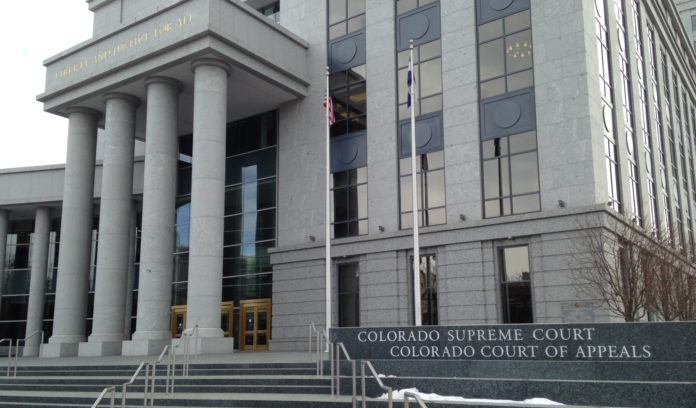
The Colorado Supreme Court tossed out a patient’s six-figure hospital bill on Monday, finding the amount due should be left to a jury to decide.
Lisa French had elective back surgery at St. Anthony North Health Campus in Westminster in 2014. Before the surgery, the hospital gave French an estimate for the two operations stating she would likely owe about $1,336 after her insurance paid its share. But after the procedures, French received a bill for more than $300,000. Her insurer paid about $73,600 of the total, leaving her on the hook for the rest.
French didn’t pay and the hospital sued her for breach of contract, leading to a 2018 jury trial in Adams County. Centura Health, which runs the hospital, argued that according to a hospital services agreement she had signed, French had agreed to pay the hospital’s chargemaster rates. A chargemaster is a list of a hospital’s “sticker prices” for its services, which don’t reflect any discounts a hospital has negotiated with insurance providers.
But the contract French signed made no mention of the chargemaster. When asked to produce the price list during discovery, Centura refused because the chargemaster was proprietary and a trade secret. The hospital filed a motion asking the court to declare that the contract French signed incorporated the chargemaster rates and her agreement to pay “all charges of the Hospital” unambiguously referred to the chargemaster, but the trial court denied the motion.
The jury found French breached her contract with the hospital. But because the court had found “all charges” was ambiguous, the jury was instructed to interpret the term and concluded it meant the “reasonable value of the goods and services.” The jury concluded French owed the hospital $766.74 — not the six-figure sum the hospital said.
A division of the Colorado Court of Appeals reversed, agreeing with Centura that most jurisdictions have interpreted contracts like the one French signed as unambiguously incorporating a hospital’s chargemaster rates.
However, in its May 16 opinion, the Colorado Supreme Court disagreed. “Because French had no knowledge of and did not clearly and knowingly assent to the terms of Centura’s chargemaster, we conclude, under long-settled principles of contract law, that the chargemaster was not incorporated by reference into the HSAs that French signed,” states the opinion penned by Justice Richard Gabriel. “As a result, the price term of the HSAs was left open, and the trial court properly tasked the jury with determining the reasonable value of the goods and services that Centura provided to French.”
Having decided the price term of the contract was left open, the justices declined to answer whether the price would have been unambiguous if the hospital agreement had clearly incorporated the chargemaster. During oral arguments in March, attorneys and justices alike noted that a typical chargemaster can contain tens of thousands of items, making it difficult for the average patient to read.
Ted Lavender, an Atlanta-based attorney representing French, argued that a valid contract between a hospital and patient should include a specific price for the procedures to be performed. “Hospitals are in a position to give an estimate for what they’re about to do for the patient,” Lavender told Law Week. “But yet they claim they’re unable to tell the patient what it’s going to cost.”
“This is kind of unique in society, where if you go anywhere to buy anything, you’re generally told a price, and you decide to buy it or not buy it,” Lavender continued. “But in something as critical as medical care — which all of us need or will need at some point — hospitals claim they’re unable to tell us what it’s going to cost to provide the care that they’re about to provide.”
In French’s case, the hospital provided an estimate for how much she would owe after insurance. But the figure Centura quoted was based on an erroneous reading of French’s insurance card by hospital staff, who mistakenly thought discounted rates applied.
Centura attorney Michael McConnell said during oral arguments that a contract based on a specific dollar amount isn’t possible in the healthcare industry because a hospital can’t predict in advance which procedures or supplies will be needed for a given patient. “Going into a hospital for a surgery is not a product, it’s a process,” McConnell argued. “It’s a complicated process.” He added that Centura’s hospital service agreements now incorporate the chargemaster by reference.
The hospital group has also made its chargemaster public as required by a Centers for Medicare and Medicaid Services price transparency rule that took effect in 2021. The rule requires hospitals to publish a list of standard charges for all items and services via a machine-readable file. It also requires hospitals to make a “consumer-friendly” list of charges available for a more limited set of services that can be scheduled in advance. Additionally, a 2017 state law required Colorado hospitals to post self-pay prices for common procedures.
The Denver Post reported last fall that only 34 of 87 Colorado hospitals surveyed had posted all prices required by law while another 34 posted just the chargemaster prices. Earlier this month, the state legislature passed a hospital price transparency bill that could give hospitals even more reason to go public with their pricing. House Bill 22-1285, which is awaiting the governor’s signature, would prohibit hospitals from collecting medical debt if they fail to follow the CMS rule and state price transparency laws.
Lavender, French’s attorney, said he was pleased to see a unanimous decision in his client’s case. “I think it validates the case that we put forth and the entire process that we went through,” he said, adding that the amount the jury determined French should pay matched the findings of an audit by the company that administered her insurance plan.

